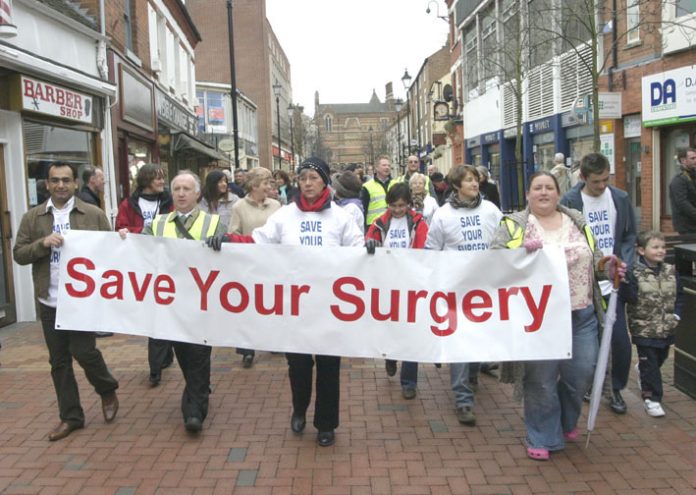Public sector union UNISON yesterday rejected a call from the Confederation of British Industries (CBI) for ‘failing’ hospitals to be closed and replaced by privately-owned clinics.
A UNISON spokeswoman told News Line: ‘We’ve said time and again that private companies do not have the answer to turning around hospitals.
‘They don’t have the expertise or experience in running critical A&E departments.
‘The key issue is that hospitals are facing difficulties because of the increased involvement of the private sector in the NHS.
‘Independent Treatment Centres and private contractors are draining much-needed money from hospitals into the pockets of private companies.’
A BMA spokesman said: ‘You can’t dismantle hospitals sector by sector. They are inter-dependent. If you take away one you threaten to destabilise it – it becomes unviable. It is a vicious spiral of descent.
‘If there are problems within a hospital, the answer is to look at what is causing those problems and put them right, not sacrificing services.’
A CBI report published on its website yesterday calls for ‘underperforming’ health services to be shut down and for privately-owned centres to be built within the NHS, which will, it claims, increase competition and improve standards while remaining free to patients.
It states: ‘The CBI believes competition must be used effectively and thought about strategically if we are to transform NHS services and make them more responsive to the needs of patients.’
It claims that ‘failure in the NHS, clinical and financial’ is ‘becoming more evident’.
The CBI concludes: ‘The issue of failing NHS trusts is politically sensitive, but without rational consideration of using restructuring and closure as a means of improving outcomes, the damage to the NHS is systemic, and not simply localised.
‘Strategic considerations should not be deferred for the sake of avoiding negative coverage in the local media, for example.’
Calling for ‘vigilance about enforcing the competition rules’ the CBI says: ‘The Department of Health must be a central competition champion: where competition exists, support it; where it is lacking, promote it; where it is being blocked, challenge the barriers.’
It urges: ‘The new principles and rules on competition must be rigorously enforced so all PCTs (Primary Care Trusts) comply with them.’
The CBI says ‘With much of the NHS, patients visit providers because there is (or is perceived to be) no alternative.’
It claims: ‘Patients often feel the need to take what they are given: often this is very good, sometimes it is poor.
‘This inertia in the system also prevents poor providers being driven from the market. But when underperforming providers are propped up, the NHS cannot improve.’
Pushing private involvement, it says: ‘Alternative providers should, in addition, have more opportunity to help failing providers.’
It says: ‘The Department of Health has acted to address this issue by introducing a new NHS performance management regime and a new merger and acquisition policy.
‘This is welcome but the CBI is concerned that policy on failure mechanisms will not go far enough to encourage a dynamic, patient-led healthcare market.’
Commenting on the report, a DoH spokesman said: ‘We welcome the CBI’s endorsement of the government’s investment in, and reforms of, the NHS.
‘They have provided a balanced and constructive assessment of progress which is similar to that of the Audit Commission and the Healthcare Commission.
‘We are already delivering much of what the CBI is proposing and agree the areas of NHS reform that need accelerating (patient choice and information; transforming commissioning; effective market management).
‘Our current work with the NHS through the World Class Commissioning programme, more effective system management and patient choice for primary and secondary care is designed to accelerate that pace of change.’
